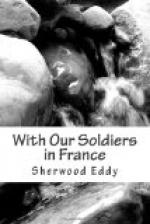One chaplain says of the men: “I am sure the soldier has got religion: I am sure he has got Christianity; but he does not know he has got Christianity. I am convinced that of the hundreds of men who go into action the majority come out affected towards good rather than coarsened. They come out realizing that there are times when they cannot get on without God; they are not frightened of Him, they flee to Him with their simple cries for strength.”
While another, a student who laid down his life at the front, makes this valuable suggestion as to the presentation of Christ: “When I was talking to them at these services, I always used to try to make them feel that Christ was the fulfilment of all the best things that they admired, that He was their natural hero. I would tell them some story of heroism and meanness contrasted, of courage and cowardice, of noble forgiveness and vile cruelty, and so get them on the side of the angels. Then I would try and spring it upon them that Christ was the Lord of the heroes and the brave men and the noble men, and that He was fighting against all that was mean and cruel and cowardly, and that it was up to them to take their stand by His side if they wanted to make the world a little better instead of a little worse.”
III
The third question discussed with the men was, What is the attitude of the soldier to the churches, and what lesson has the Church to learn from the present war? Let it be said at the very outset that the writer speaks as a member of the Church and in deep sympathy with it. As the divinely constituted organization which stands for the highest human ideals, and for the establishment of the Kingdom of God on earth, we all are, or ought to be, members of the Church. “With charity for all and with malice toward none,” we see no ground for self-complacence on the part of any branch of the Church, and no part of it which deserves sweeping condemnation from the rest. Doubtless it will seem to many that it is unwise to confess our faults, but the men at the front are not silent, however much we may desire to be. We would do well to face the facts which this war is forcing upon our attention, however much we may dislike the searching glare of the present conflict. Obviously something is wrong. Had the Church fulfilled her divine mission, the present war between so-called “Christian” nations would have been impossible.
As was stated in the preceding chapter, according to the opinion of the majority, less than 20 per cent or one-fifth of the men are vitally related to any of the Christian communions. A series of conferences held with individuals and carefully selected groups of men and officers brought out by a general consensus of opinion the following points as representing the attitude of the men toward the churches:




